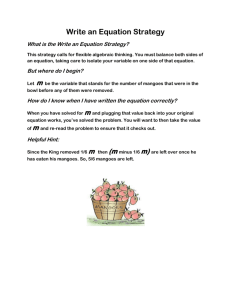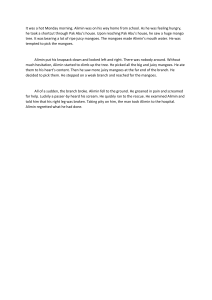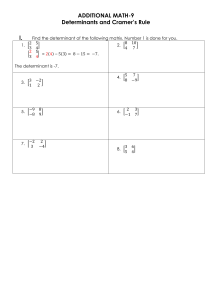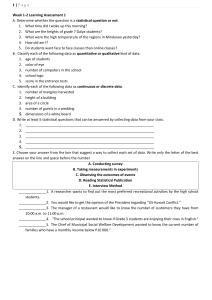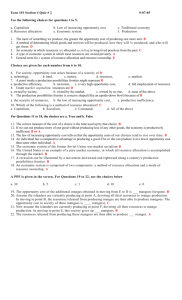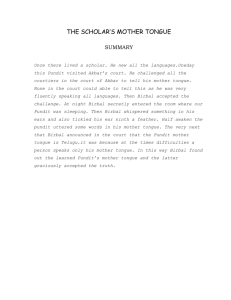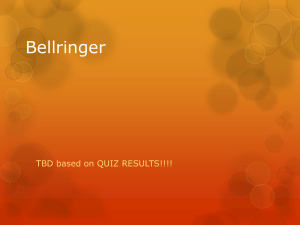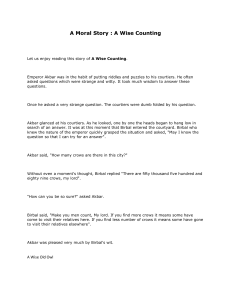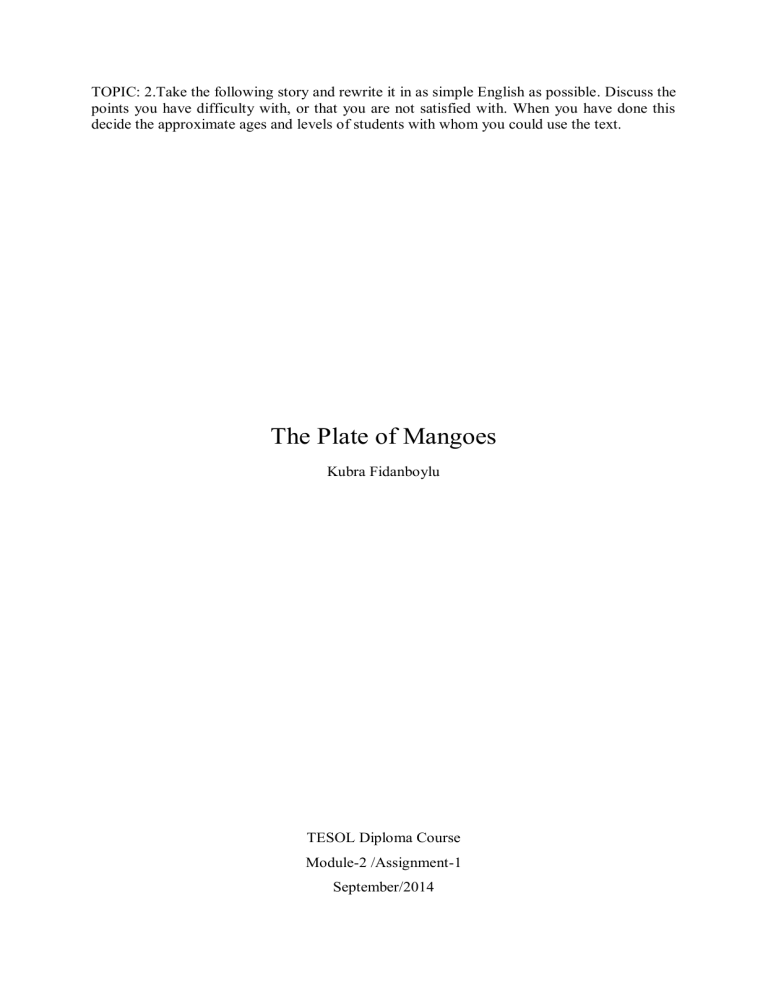
TOPIC: 2.Take the following story and rewrite it in as simple English as possible. Discuss the points you have difficulty with, or that you are not satisfied with. When you have done this decide the approximate ages and levels of students with whom you could use the text. The Plate of Mangoes Kubra Fidanboylu TESOL Diploma Course Module-2 /Assignment-1 September/2014 The Plate of Mangoes Original text: Over one evening the emperor and the begum were sitting on a verandah overlooking the river Jumna, and eating mangoes. The emperor was sucking the juice from the mangoes and setting aside the outer skin, with the big seed-kernal inside, placing them on a plate in front of his wife. By the time Birbal came in to discuss affairs of state, a huge mound had piled up as the emperor feasted on one mango after another. The emperor’s eyes danced with mischief. ‘Look Birbal, just see how greedy the empress is. Look at the huge mound in front of her.’ The begum pouted in anger, but before she could protest Birbal said ‘It must be the result of the bad company Her majesty is keeping.’ ‘What do you mean?’ said Akbar. ‘Are you trying to imply that I am greedy? Look, there is nothing before me, while there is this huge pile of skin and stones in front of her.’ ‘That’s what I mean,’ replied Birbal. ‘Her majesty has merely been sucking the mangoes in the normal fashion, while you have obviously eaten them all up, skin and stones not excepted!’ The begum erupted in peals of silver laughter, while the emperor, outwitted once again, slapped his thighs at the joke against him and smiled indulgently. Simple version: One night the king and begum sat beside the river and ate mangoes. The king only ate the fruit and put all the skin and seeds on his wife’s plate. Birbal joined them while the king was eating more and more mangoes. The troublesome king said; “Look Birbal at the big pile in front of the queen.” 2 Portfolio link: https://colorsofteaching.wordpress.com/about/ The begum was upset. But before she could say anything Birbal said: “It must be because the queen started to look like you.” “What do you mean?” said Akbar. “Look at my empty plate and the full plate in front of the queen.” “That’s what I mean,” replied Birbal. “The queen has eaten mangoes but not more than you. You have eaten up all of them including the skin and seeds!” The begum started laughing and the king smiled and let it pass. Discussion According to Vocabulary Profilers (website reference listed below), the original text “The Plate of Mangoes” was composed of 71.56 % K1 words, 9.17 % K2 words, 1.38 % AWL words and 17.89 % Off-list words. These four frequency levels are: 1. The list of the most frequent 1000 word families (K1 words) 2. The second 1000 (K2 words) 3. The Academic Word List (AWL words) 4. Words that do not appear on the other lists (Off-List words) (Heatley, Nation, Coxhead, 2002). After simplifying the text, the results were; 83.94 % K1 words, 8.03 % K2 words, 0.00 % AWL words and 8.03 % Off-list words. The Off-list words include cultural names like begum and Birbal. According to the results I obtained from Vocabulary Profilers, I either changed or omitted the academic and off-list words. For instance, Emperor was replaced to king also low frequency words such as veranda and outwitted were omitted. Even though begum is a low frequency word I chose to leave it in the simplified version of the text because, it is a cultural word that I would like to teach my students as additional knowledge. Prior to that, I added the word ‘queen’ as a pair to the word ‘king’. Furthermore, with the added phrases such as “the queen started to look like you”, I would discuss different types of metaphors and explain that it is not about the physical appearance of the king and that it is about his characteristics. 3 Portfolio link: https://colorsofteaching.wordpress.com/about/ Personally, simplifying the text was a harder task than I thought it would be. It was not easy to find simple alternatives to the words used in the text and to break up the sentences so they were no longer hard to comprehend for the English learner. I also tried to omit the unnecessary aspects within the text. While I was doing so, I was concerned about not having the necessary means to deliver the ‘meaning’ as a whole. I believe some of the meaning might have been minimized, however not lost. During my research about ‘how to simplify a text’, I learned that the shorter and summary like the text is, the easier it is for the language learners to read and understand it. Therefore, I was able to reduce the original text from 216 words to 136 words. I would prefer to use the original text with the advanced learners because of their senior vocabulary level, they would not encounter many difficulties comprehending the text and discussing about it. On the other hand, I would use the simple version with lower and upper intermediate level. Even though the text is now much simpler than the previous one, I would like to have a thorough discussion with my students after they have read the text. In order to have this discussion the student’s general level has to be intermediate. I would like to discuss different topics in depth, such as; lying, cheating and slander. Furthermore, the conversation can continue by discussing the effects it can have on a person, the harm it can cause, the feelings that can accompany etc. In conclusion, the story portrayed in the text gives a lesson about different types of morals thereby; I would discuss all these aspects producing a dual lesson where English language and life morals are taught. 4 Portfolio link: https://colorsofteaching.wordpress.com/about/ References ○ Heatley, A., Nation, I.S.P. & Coxhead, A. (2002). RANGE and FREQUENCY programs.Retrieved 19 September 2010, Retrieved from http://www.victoria.ac.nz/lals/staff/paul-nation.aspx ., Cobb,T. Web Vocabprofile [accessed xx Month 200x from http://www.lextutor.ca/vp/ ], an adaptation of Heatley, Nation & Coxhead's (2002) Range. 5 Portfolio link: https://colorsofteaching.wordpress.com/about/
